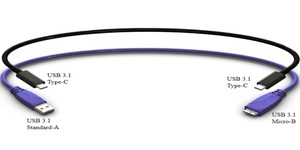USB Type-C to get cryptographic authentication
April 13, 2016 | 12:15
Companies: #usb-30-promoter-group

The USB 3.0 Promoter Group has announced that it is to add authentication to the USB Type-C standard, as a means of locking the platform down against low-quality cables and chargers that could damage devices.
Increasingly popular on mobile devices, USB Type-C offers a number of improvements over previous generations of the Universal Serial Bus. Chief among these is a redesigned connector which allows cables to be plugged in either way up, along with support for higher data throughput and heftier current - enough to keep a laptop equipped with only USB Type-C connectors, such as Apple's latest MacBook, running from the mains, in fact.
The standard has been suffering from bad press of late, however, with a Google researcher taking to Amazon to leave reviews of cables and chargers which he claims are so badly made as to lead to potential device damage - from overheating to short-circuits that leave systems dead. The USB 3.0 Promoter Group's answer? Cryptographic authentication of certified hardware, borrowing a leaf from Apple's book.
'USB is well-established as the favoured choice for connecting and charging devices,' boasted Brad Saunders, USB 3.0 Promoter Group chair, at the announcement. 'In support of the growing USB Type-C ecosystem, we anticipated the need for a solution extending the integrity of the USB interface. The new USB Type-C Authentication protocol equips product OEMs with the proper tools to defend against ‘bad’ USB cables, devices and non-compliant USB Chargers.'
The authentication technology is set to arrive in the USB Power Delivery 3.0 standard, which is otherwise unchanged from its predecessor. Using 128-bit cryptography and hardware from STMicroelectronics, USB Type-C devices will be able to query the status of connected chargers and cables - even if used only for power, rather than data, purposes - and block the use of devices not containing a valid certificate.
The system will, the Group has suggested, be flexible in its implementation. While it would certainly be possible for a hardware vendor to lock its products down against the use of any and all third-party USB Type-C devices, the system is claimed to offer advantages to end-users, too: the Group claims that individuals could toggle the status of third-party charger support on their smartphones to improve security while travelling, or that companies could set corporate policies preventing the use of third-party USB storage devices.
The Group has not yet indicated when the USB Power Delivery 3.0 and authentication standards will be implemented by its member companies in commercial products.
Increasingly popular on mobile devices, USB Type-C offers a number of improvements over previous generations of the Universal Serial Bus. Chief among these is a redesigned connector which allows cables to be plugged in either way up, along with support for higher data throughput and heftier current - enough to keep a laptop equipped with only USB Type-C connectors, such as Apple's latest MacBook, running from the mains, in fact.
The standard has been suffering from bad press of late, however, with a Google researcher taking to Amazon to leave reviews of cables and chargers which he claims are so badly made as to lead to potential device damage - from overheating to short-circuits that leave systems dead. The USB 3.0 Promoter Group's answer? Cryptographic authentication of certified hardware, borrowing a leaf from Apple's book.
'USB is well-established as the favoured choice for connecting and charging devices,' boasted Brad Saunders, USB 3.0 Promoter Group chair, at the announcement. 'In support of the growing USB Type-C ecosystem, we anticipated the need for a solution extending the integrity of the USB interface. The new USB Type-C Authentication protocol equips product OEMs with the proper tools to defend against ‘bad’ USB cables, devices and non-compliant USB Chargers.'
The authentication technology is set to arrive in the USB Power Delivery 3.0 standard, which is otherwise unchanged from its predecessor. Using 128-bit cryptography and hardware from STMicroelectronics, USB Type-C devices will be able to query the status of connected chargers and cables - even if used only for power, rather than data, purposes - and block the use of devices not containing a valid certificate.
The system will, the Group has suggested, be flexible in its implementation. While it would certainly be possible for a hardware vendor to lock its products down against the use of any and all third-party USB Type-C devices, the system is claimed to offer advantages to end-users, too: the Group claims that individuals could toggle the status of third-party charger support on their smartphones to improve security while travelling, or that companies could set corporate policies preventing the use of third-party USB storage devices.
The Group has not yet indicated when the USB Power Delivery 3.0 and authentication standards will be implemented by its member companies in commercial products.

MSI MPG Velox 100R Chassis Review
October 14 2021 | 15:04








Want to comment? Please log in.